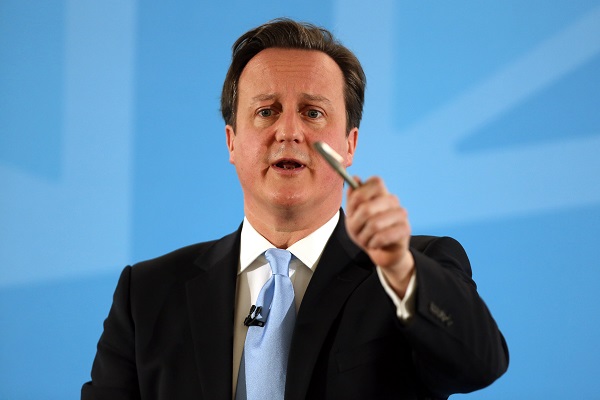This morning’s papers have followed the lead of yesterday’s TV news bulletins: the prime minister’s immigration speech was not the success it might have been. The Times is lukewarm (£). The Guardian is suspicious. The Mail is derisive. And our own Douglas Murray is contemptuous of a speech which merely stated the ‘utterly obvious’.
Yet again, the government has failed to convince the media. Part of the problem is that the numbers are inconclusive. The Guardian has built on yesterday evening’s BBC news reports, which claimed that only 13,000 migrants from that part of the EU have claimed JSA since 2009. This contrasts with Mr Cameron’s concerns about a widespread ‘something for nothing’ culture. The paper also adds that migrants account for only 9 per cent social lettings. Downing Street has countered each claim, usually by arguing that the strain on public services is getting more intense; for example, it points out that there was a 40 per cent increase in the number of social lettings to migrants between 2007-08 and 2011-12.
The occluded figures do not necessarily prove or disprove either side’s case. All they suggest is that we look at immigration through very dark glass, which implies that the government has a loose grasp on the system. Indeed, Mr Cameron sat down yesterday and the Home Affairs Select Committee immediately popped-up with yet another damning report into the work of the UK Border Agency. It is estimated (note the word estimated) that the 312,726 backlog cases will take 24 years to clear.
It’s a fine statistical illustration of chaos; but it does little to contextualise the social and economic cost of systemic difficulties. The Refugee Council and a group called Maternity Action recently published a report which found that UKBA’s policy of moving refugees around the country in search of accommodation, often multiple times, puts enormous strain on midwifery. This can, obviously, affect the welfare of mother and child, placing further pressure on health and welfare services.
The report is almost certainly indicative of wider problems in the immigration system. UKBA would have cause to say that its accommodation policies are necessitated by the national housing shortage. Indeed, plenty of talking heads (from both the right and the left) have popped up on the news in the last 24 hours to say that this latest immigration row (and the continuing fracas over the so-called ‘bedroom tax’) is really a proxy for a much needed debate on housing, and the allocation of social housing in particular.
This is certainly true; but, even in this context one cannot ignore the continued stream of evidence about the lamentable UK Border Agency. 9 per cent of social lets may go migrants; but plenty of migrants are plainly lost to officialdom, living in the Wild West of the cheap private rental market (another part of British life that needs urgent attention). Official statistics about this group are hard to come by, so let me illustrate the point with an anecdote. I once rented in a block of flats in east London. Upstairs lived three gainfully employed builders of unknown eastern European nationality; they were residing in one bedroom flat. My landlord had an insurance dispute with the builders’ landlord, a mysterious and very uncooperative man who had to be threatened with legal action before he began to comply with the insurers’ wishes. I often had to liaise with the builders about surveyors’ visits and so forth. One day the builders – who were required as witnesses in the dispute – disappeared. Another eastern European gentleman, who refused to give me or my landlord his full name or any contact details, arrived and explained that he was the builders’ associate and a representative of their landlord, adding that he would act as intermediary in the future; not that an untraceable man was much use as an emissary for vanished foreigners and an uninterested landlord.
This example is not isolated, even in my limited experience. I once served on a jury which heard a case about two illegal Vietnamese immigrants accused of assisting in the production of cannabis. They had been arrested in a small house in Lewisham. They had been apprehended while asleep on the floor of a bedroom surrounded by more than 40 cannabis plants, numerous halogen lamps and what the prosecution memorably described as ‘other horticultural paraphernalia’. The immigrants’ defence was that they had nothing to do with the production of the plants, which they said was carried out by the persons who were also arrested during the raid and who had already pleaded guilty. They said that they had only been occupying the house for a few days, adding that they had been moved to Lewisham from their former accommodation on the floor of a sweat-shop in Walthamstow by a person they knew as ‘Teo’. They understood that Teo was going to secure them accommodation above a restaurant in which they would work. (I’m not sure I believed their plausible explanation beyond reasonable doubt; but, as it happens, the case collapsed because the overstretched and/or incompetent police had not examined the defendants’ mobile phones, upon which the defence rested.)
What is one supposed to make of a system – and a society – where these varied but connected events can happen? The costs – economic, social, political and above all human – are enormous.






Comments